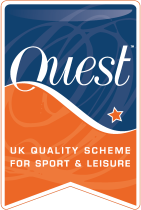Introduction
Following detailed work with partners and stakeholders, Quest has now fully rolled out the new and improved Quest for Active Communities Model alongside the well-established Facility Management model.
Initially launched in 1996 Quest remains the leisure industry’s only recognised Quality Assurance Tool for sports development and physical activity; designed to measure how effective organisations are at providing high quality customer service.
Quest is supported by Sport England and all the Home Country Sports Councils, CIMSPA, CLOA, SPORTA, SRA and Ukactive who all sit on the Quest Board and oversee its design and development. Quest is now widely recognised as a leading continuous improvement model designed by the sector for the sector.
In its development and operation Quest references and applies the standards of:
- Customer Service Excellence
- Investors in People
- EQFM
- CSIT
- Culture and Sport Impact Outcomes Framework
2016 was an amazing year for all those involved in sport and physical activity with a new Government Strategy, a monumental Olympic Games and sublime Paralympics. The vision, direction, innovation and change that underpins these developments and achievements means that Quest itself must adapt and improve so that we offer our Clients a model that provides robust check and challenge in a positive and supportive way. Our new approach provides continitity and change. Through our expert assessors, the production of new best practice guidance and a more refined rating system we are confident that Quest will help all our Clients to work towards and demonstrate high performance, support “good to great journeys” and evidence effective local delivery.
We continue to work with an expanding and varied number of Clients including Leisure Trusts, Football Clubs, County Sports Partnerships and Local Authorities now and as part of the Quest process we work hard to share valuable benchmarking information between Clients to help identify achievements and identify areas for learning, growth and improvement at this challenging time for the sector.
We now have over 600 facilities and 50 development teams involved in Quest in one shape or another making it the most relevant improvement and accreditation scheme in the sector.
We have reviewed all our guidance material to align it with current best practice in the field and to orientate it to Government and Sports Council’s Strategies that are now being rolled out.
We have worked with the following organisations to improve guidance and assessment processes in 2016:
- Substance around the Sport 4 Development agenda
- Public Health England and Sport England around Health and Wellbeing
- EFDS around Engagement with Disabled People
- NSPCC’s Child Protection in Sport Unit around Safeguarding
Modules and Guidance
The new module guidance material can be accessed here. This will provide you with details of:
- 7 Core Modules written with Sport England and the Quest Industry Board
- New 5 ranking Ratings System through the introduction of a “Very Good” Category to help support the improvement journey
- Performance Criteria set out in each Module to help differentiate performance levels more precisely
- New updated Guidance across all Modules aligned to latest Sport England and Home Country strategies and outcomes
- New Modules in Health around physical wellbeing; mental wellbeing and referral programmes
- New Modules on the Sport 4 Development agenda written with Substance and Street Games input
- New Module on Insight
- New Modules of “Engaging with… “(target audiences and under-represented groups)
- New dual accreditation modules written with EFDS and StreetGames
- New Governance Module reflecting the new Code issued by Sport England and UK Sport
In addition:
- We have developed a new Directional Review process after 12 months to support improvement planning.
- We are promoting more consortia approaches where Clients come together locally to share best practice and learn from each other - either in their locality or special interest group
Our Assessors are experienced industry professionals who act as “critical friends” providing a constructive process providing:
- An independent review of the service
- A check and challenge process for teams/organisations
- An opportunity to benchmark and compare with best practice in the sector
- An opportunity to have the quality of your work nationally accredited
- An opportunity to develop teambuilding and team working
- A process by which leaders can assess what “Good/Great” looks like and how you measure up.
Quest Process - 5 Step Approach
Step 1
Prior to the assessment teams can complete self-assessment preparation forms to begin the improvement journey and help the team/service recognise strengths and opportunities for growth.
Step 2
An external 1 or 2 Day assessment led by an experienced assessor from the sector covering 7 core modules and 5 choice modules.
These are supported by Guidance Notes, written by the sector for the sector around best practice across the fields of sports development, physical activity and sport for development.
Step 3
A report with detailed and overall ratings is provided to the Client together with a completed Service Improvement Plan made up of the Assessor’s recommendations for growth, improvement and development. This is linked to a Benchmarking table open only to Quest Clients working in the sector with opportunities to attend National Benchmarking Events throughout the year.
Step 4
A Directional Review which can take place between 12 and 15 months after the initial Assessment to suit the Client. This will incorporate a staff workshop on engagement and productivity together with mentored support around identified improvement themes. This process can involve a Peer from the network - a hugely successful initiative pioneered with the support of APs, which provides real opportunity for learning and sharing of best practice.











